SIMPLY ABSTRACT
Rafi Hossain: Bipasha, you always carry a jovial aura. How do you manage to reflect that in your personal and professional life?
Bipasha Hayat: I try to enjoy every aspect of life. It gives me great joy when a flower blooms in my garden. I love the feeling I get when I lightly brush my hand across the leaves and flowers. I love life, and I believe life is beautiful. I find happiness in the smallest and simplest things. It's very apparent in my relationship with both my husband and my work. I always try to contribute to the greater good.
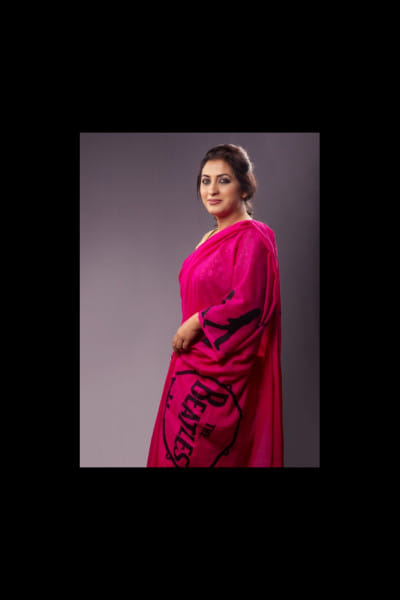
Rafi: You have a very busy schedule. Do you get any time to yourself?
Bipasha: I do get to spend leisure time. Whenever I travel abroad for work, I reflect back on myself and my actions. It helps me find my flaws, and I look for ways to correct them. In the evening, I sit with a cup of tea in hand, and reflect on life. Sometimes, such moments of self-reflection make me wonder why I failed to notice a certain flaw before.
Rafi: Do you think the consequences of our actions determine the joy and happiness in our lives?
Bipasha: Yes, our surroundings greatly influence our actions. But, I believe that fate plays an important role in our lives as well. Sadness and joy are not inseparable; I'd rather believe that they go hand in hand. For instance, a few days ago, I saw two women and a child sitting on the pavement, an old torn blanket beside them. They were talking to each other without paying heed to anyone around them. I felt that they had all the happiness in the world. Happiness, to me, is a concept. It's the consequences of our actions that determine how our lives will proceed.
Rafi: Let's talk about your paintings. It seems that you're currently focusing on abstract art, or that you have developed an interest in that area. Can you tell us about it?
Bipasha: Every artist tries to depict their philosophy of living and thinking through their art. As an actor, I always looked for new and different characters, and tried to portray each of them uniquely. I aim to do the same with my paintings. I'm not a philosopher, but I do believe that everyone has a vision. With time, a person gains more experience and meets different people, and their vision gradually widens. I myself am changing and evolving every day, and that is undoubtedly reflected in my work. I have been working with abstract art for quite a while now; the main subject of my paintings is memory. To me, someone without memories is only a shell of a person. So, you could say that most of my works are conceptual. Rather than focusing on the painting itself, I try to focus on what I'm trying to express through it.
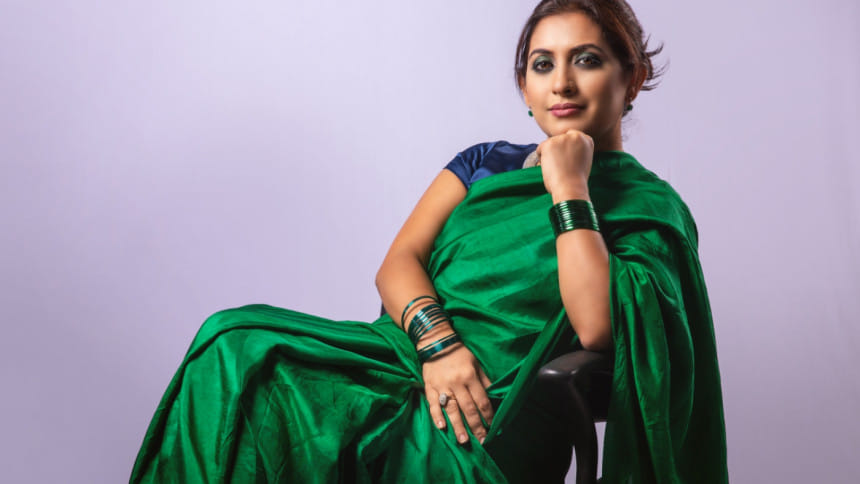
Rafi: As an artist, you travel internationally and meet other artists from all over the world. What does it take to be an artist?
Bipasha: Every artist is unique, and if someone works with honesty and passion, it is bound to stand out. When an artist constantly tries to understand themselves, their visions are reflected in their work. At the same time, they will be able to come up with new and interesting ideas. That is a very important aspect to becoming a good artist. I believe that it's achievable, irrespective of where a person is from.
Rafi: It seems that folk art is quite similar, no matter where you go in the world. Why do you think this happens?
Bipasha: I travelled to Poland a few days ago, and got the chance to see some of their folk art. I was surprised to find that they were quite similar to our own rickshaw paintings – the use of primary and secondary colours and the form itself looked much like our folk art. Similarly, I had an exhibition some time ago at the Bengal Gallery, and one of my paintings was named Khoto (wound), which represented a state of mind. When I visited The Metropolitan Museum of Art, I was amazed to see how a Japanese painter's artwork resembled Khoto. I then realised that as human beings, our thoughts often stem from the same place. But, the journey of an artist is only expressed through their artwork. That is why the same flower painted by two different artists will never look alike.
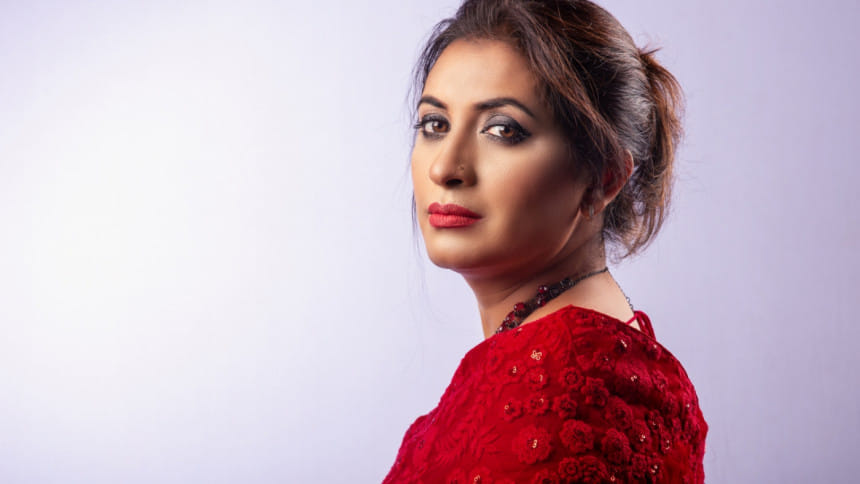
Rafi: You and Tauquir bhai have been married for twenty years now. Is there anything you would want to change about him?
Bipasha: No, I wouldn't want to change anything about him. Both our thoughts are either about our child, or regarding the subject of arts. Our discussions always revolve around books, art, music, theatre and such. The decisions we make in life are always unanimous. To me, Tauquir is more of a friend than a husband.
Rafi: A lot of people marry out of love. But, over the years, they might fall out of love. Why do you think that happens?
Bipasha: I can't say why that happens. I myself have written many dramas on failed marriages. Tauquir and I both acted in my drama, Ghor, which was shot at our house. It told the story of a mother who left her four year-old child; the story was based on the life of someone quite dear to me. These are situations that make us think. I don't know the solutions to such problems, but rather, direct the questions at the audience. I believe that there are many reasons such issues arise in a marriage. That is why, it is important to enrich your knowledge on such topics. That can often help you analyse your condition, and only then can you begin dealing with such problems.
Rafi: Recently, there has been a rise in heinous crimes, like child rape. As an artist, what do you have to say about this?
Bipasha: Majority of the people in Bangladesh are uneducated, and often, this leads to a lack of conscience. Had they been provided with proper education, it would've prevented them from committing such crimes. Another reason might be the misuse of internet. To tackle this issue, I would urge the government to take certain measures, and shut down any online sites which promote violent or disturbing content. Another step that must be taken is providing a good home for children living on the streets. Only then, we can hope for a brighter future. I believe that it is important for all of us to try and improve the situation in our own ways.
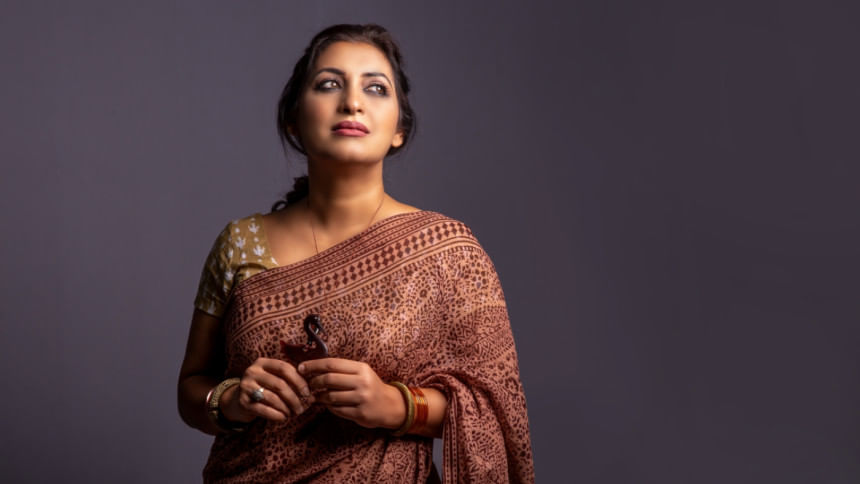
Rafi: Singing is definitely one of your many talents. Do you still practise music by yourself?
Bipasha: I don't practise singing religiously. However, if I have a song stuck in my head, I spend the whole day by the harmonium.
Rafi: Do you have any unfulfilled wish?
Bipasha: I wish to see my children grow up to be good human beings, in every sense of the word. I hope they help the poor and contribute to the greater good of the society. I don't know if I will have the privilege of watching them take such steps, but I hope I can instill such values in them.
Rafi: Do you plan to make a comeback in theatre?
Bipasha: I do plan to go back to theatre, once my children grow up. I have a very special place in my heart for it.
Rafi: Do you miss the time when you were at the peak of your popularity?
Bipasha: No, I believe in doing good work. Rather than gaining popularity, I find joy in acting, writing and painting.
Transcribed by Shreya Shomoyeeta

 For all latest news, follow The Daily Star's Google News channel.
For all latest news, follow The Daily Star's Google News channel. 

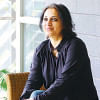


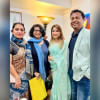



Comments